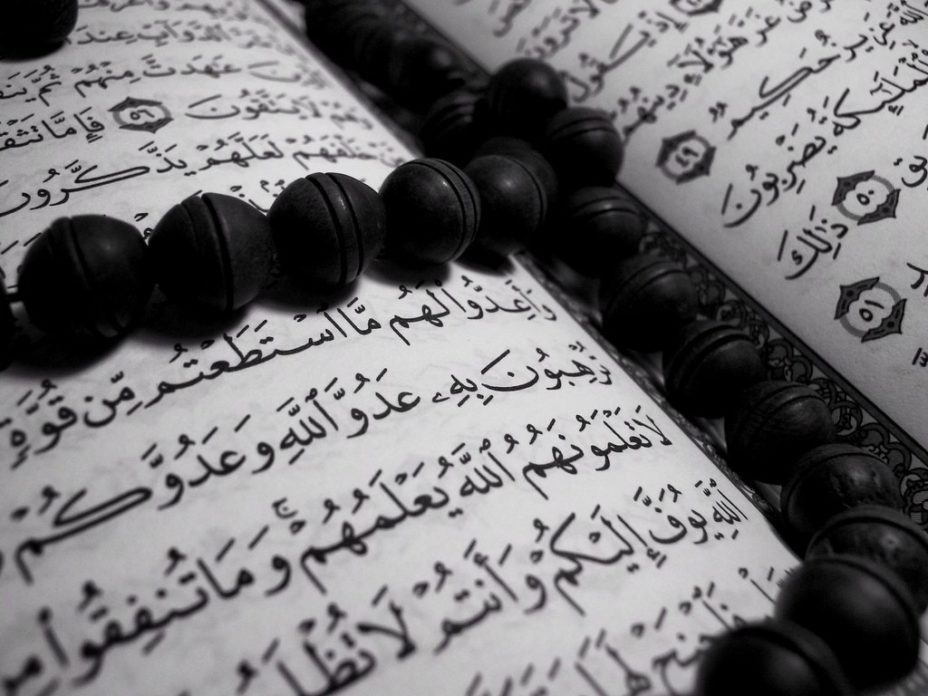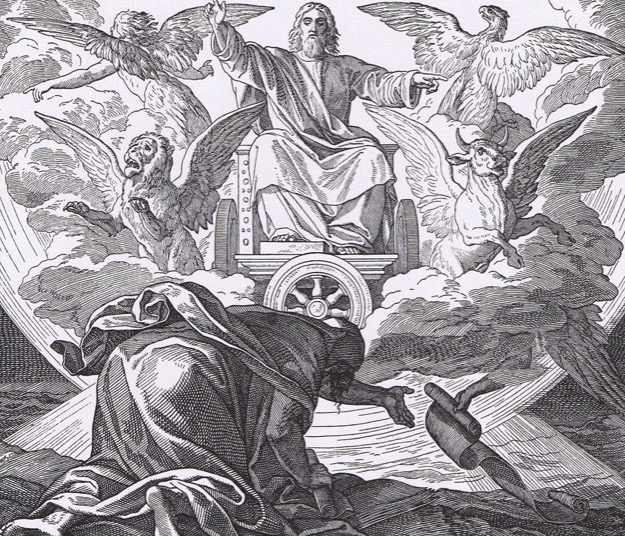- And do not give favor [in order to] increase
- And for your Lord then be patient.
- Then when the trumpet is blown,
- That Day will be a hard Day
- For the disbelievers, not easy.
- Leave Me and whom I created alone,
- And I appointed him extensive wealth
- And children with him.
- And I spread out ease for him.
- Then he desires that I should add more!
- Nay! Indeed, he has been obstinate to Our Signs.
- I will burden him with a hard ascent.
- Indeed, he thought and plotted
- So is he destroyed, how he plotted!
- Then is he destroyed, how he plotted!
- Then he looked.
- Then he frowned and scowled.
- Then he turned back and waxed proud.
- Then he said, “This is naught but spells transmitted (of old).”
- “This is naught but the word of a human being.”
- I will burn him in Saqar!
- And what will make you know what Saqar is?
- It does not spare, and it does not leave (alone),
- Scorching the human.
- Over it are nineteen.
- And we have not made (anyone) companions of the Fire except Angels. And we have not made their number except as a trial [or affliction] for those who disbelieve–that those who were given the Book may be made certain and those who believe may increase in faith, and that those who were given the Book and the believers may not doubt, and that those (with) disease in their hearts and the disbelievers may say, “What does Allah intend by this example?” Thus Allah leads stray whom he wills, and he guides whom he wills. And none knows the hosts of your Lord except him. And it is naught but a reminder to human beings.
- Nay! By the moon
- And the night when it withdraws,
- And by the morning when it shines,
- Indeed, it is surely one of the greatest,
- A warning to human beings.
- To whoever of you wills to advance or lag behind.
- Every being will held hostage for what it has earned,
- Except the Companions of the Right,
- In the Gardens, they will question
- About the criminals,
- “What led you to Saqar?”
- They said, “We were not of those who prayed,
- Nor did we used to feed the poor,
- And we used to talk vainly with vain talkers,
- And we used to deny the Day of the Code,
- Until the inevitable came to us.
- Then intercession of the intercessors will not benefit them.
- Then what (is happening) with them, that they turn away from the reminder.
- As if they were shying donkeys,
- Fleeing from a lion.
- Rather, every one of them desires that he may be given Scripture, spread out.
- Nay! Rather they do not fear the Hereafter.
- Nay! Indeed, it is a reminder.
- So whoever willed remembered it.
- And none will remember except that Allah wills. He is akin to fear and akin to forgiveness.
Italics indicate a much later addition.
6. This is a singular “you” which is still addressing Muhammad by extension from the earlier ayat, but is conceptually extended to all believers. The word “favor” here shares a trilateral root with the “manna” of the Hebrew and is used in that form for that manna, in fact. This word had entered the Arabic with this meaning long ago. (It’s not the same “favor” as in 92.)
12. “Appointed” from context. It’s the Arabic generic “make” verb. I really like “extensive” as a tight translation here–it has the connotation of spread out, just like the English word.
13. “Children” or “sons.” At any rate, there’s at least one male kid in the bunch! “With him” actually comes from the word for “witness” and means that they are, literally, with him, but there’s no decent English word that gives quite the same meaning.
14. Like a bed being made.
15. “Add more” is lit. “increase,” but that doesn’t sound right in English. Subjunctive suggests the “should.”
17. If you think this sounds like Sisyphus, that’s because it does.
18. “Plotted” here is great because it has the same root of measuring as the word used in Arabic.
23. A bit archaic English for the “waxed” but it’s better than “was” in its meaning. Thanks, Arberry.
26. Saqar is an odd word. It’s used for Hell three times in this surah and only once ever again in the Quran. I don’t know where it comes from. Neither does any commentary I’ve found. And neither do Muhammad’s listeners, from the text.
29. “Scorching” as in creating a black, scorched char on the flesh.
31. A huge interpolation inserted later. The word “companion” is a bit embarrassing and is usually translated “keeper” or “guardian,” but this is an abuse of the word, and it is used many, many times in the Quran and is always translated as “companion” everywhere else. “Believers in faith” is actually “believers in belief”–more of the high prose of the Quran. “It is not…”–the “it” is singular feminine, which may means the Scripture. “It” could also be Hell; however, Hell isn’t typically called a “reminder,” and the Quran often is.
34. What “it” refers to is not agreed upon. I think it must be the Scripture/Quran again, because the Day can’t be a warning–day late and a dollar short–and the Quran is often called a “warning,” but some scholars think it’s that the Quran here is a warning of the Day, so they assign “Day” to the “it.”
39. “The right hand” becomes understood. The right was ritually “clean” and left was ritually “unclean” in pre-Islamic Arabia. This isn’t true in Jewish or Christian sources, though. The “left side” of a King, for instance, is inferior to but still very honorable position in the Judeo-Christian worldview, but the “people of the left hand” in the Islamic view are people consigned to hell. But oddly, Allah has two right hands in Islam, so it makes one wonder whose hand the people of the left hand were….
43. “Said” is a perfect verb–past tense. It’s a grammatical deficiency here.
45. This is a cool Arabic word for which there is no direct parallel in English. It has the sense of wading into pointless talk–an endless sort of wrangling and nitpicking and so on.
46. I’m taking the unconventional step of calling the Deen the “Code.” It’s more precisely the Law, but the law in a broad sense. Most Western people, for instance, think that sharia law is a legal code in the same sense of American laws, but it is like Jewish halakah in the sense that it encompasses a person’s entire way of life. Sharia is the “way to the watering hole” built on the deen (law-like code of belief and behavior) of the good Muslim, as expounded by specialists in Islamic jurisprudence. While it’s often translated as “religion,” in Islam, orthopraxis takes equal or even higher place than orthodoxy–that is, what you do is at least as important as what you believe. This differs dramatically from the Christian view of religion as primarily a faith that then shapes your behavior, so using the word “religion” will only create confusion among Westerners.
47. Or “inevitable” or “certain/certainty,” but the word sounds weird to use in English here. Scholars can’t decide whether this is the Hour of Judgement or death.
53. This “it” is masculine. The Book, maybe, being the Quran again?
54. Grammatical deficiency in verb tenses again
Surah Ordering
This is really the earliest that most of the rest of Surah 74 can occur if you’re following the traditional Egyptian chronology. This had to be revealed after Muhammad started getting considerable pushback–my theory is that this is one of the early rebukes of Abu Lahab, the memory of which causes scholars to mistakenly push Surah 111 impossibly early, according to the ahadith.






